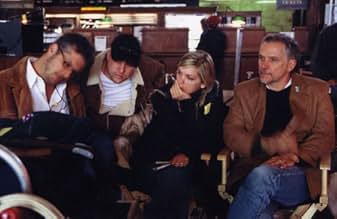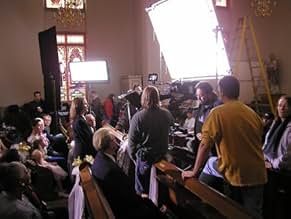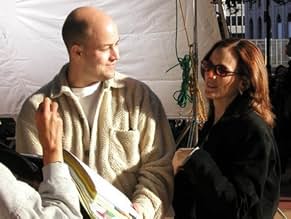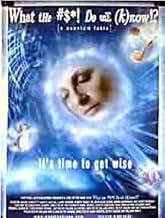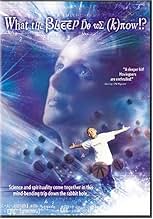Que sait-on vraiment de la réalité!?
Original title: What the #$*! Do We (K)now!?
- 2004
- Tous publics
- 1h 49m
IMDb RATING
5.2/10
14K
YOUR RATING
A fictional photographer's quest to spiritually rediscover herself is interspersed with documentary footage of scientists and theologians discussing the philosophical aspects of quantum phys... Read allA fictional photographer's quest to spiritually rediscover herself is interspersed with documentary footage of scientists and theologians discussing the philosophical aspects of quantum physics.A fictional photographer's quest to spiritually rediscover herself is interspersed with documentary footage of scientists and theologians discussing the philosophical aspects of quantum physics.
- Awards
- 2 wins total
James Langston Drake
- Groom
- (as Jame Drake)
Michele Mariana
- Tour Guide
- (as Michelle Mariana)
Featured reviews
My wife and I had heard enthusiastic recommendations and came to the film expecting something along the lines of "A Brief History of Time." Do not bother seeing this movie if that is what you're expecting! I am a professor of philosophy (with my area of specialty being philosophy of science) and my wife is a professor of biology. We found about one third of the claims (in our respected fields) to be flat out false; another third were blatant hyperbole or, at best, "poetic truth"; the final third were, indeed, true. However, the entire film was presented as if 100% of the content was uncontested scientific Truth (with a capital "T")! Many of the claims were downright embarrassing and more in line with the claims of urban legends and/or those asinine emails about weird phenomena that are forwarded to you by burned-out new-agers. Instead I highly recommend Errol Moritz's aforementioned documentary on Hawking, or perhaps his excellent "Fast, Cheap and Out of Control." In fact, I even recommend "Showgirls" over this travesty committed, sadly, in the name of science.
It's nice to see that there are some movies being made and released into mainstream theaters that actually make you think. Great fictional films do this through the delivery of their stories, but What the #$*! Do We Know does it in a much more direct way, almost like an educational film. It's a fascinating exploration of existential theories and philosophy, and is one of those very rare movies that will challenge the way you think even about everyday life. It's a strange film and moves entirely too fast for much of it's material to sink in, but it's a great exploration of quantum physics and some of the implications that it has on our lives that we really don't think about, but should.
The story sporadically focuses on the life of Amanda (Marlee Matlin), a deaf woman suffering through heartbreak and work troubles but who ultimately alters her perception by applying certain rules and theories of quantum physics, as I imagine we are expected to after seeing the movie. The great thing about the movie is that it makes you think, but the biggest problem with it is that it uses presentation to make simple statements seem grand and make crazy assertions seem like they have merit.
There is one point where the movie says, "Here's a puzzle - why should we be able to remember the past and not have the same access to the future?'' What is that? A completely obvious fact of linear time is rendered strange just by being in this movie. It's odd that the movie delves so deep into such statuesque disciplines as quantum physics and the very fabric of the universe, while not knowing why you can remember a conversation you had today, but for some weird, unknown and mysterious reason, you can't remember a conversation you will have tomorrow.
The film also makes outlandish claims and then shrouds them in the mysteriousness of unobservable history. There is a part of the movie that claims that when the first ships arrived in what is now North America, the Native Americans looked out to sea and saw the water parted by the ships, but could not see the ships themselves because they had never seen anything like them before. This, obviously, is utter nonsense, but the movie uses it as an example of its suggestion that there are different levels of reality for different people. There is no pure, objective reality, but different plains of existence for different people.
A friend of mine, who hails this as one of the greatest films he's ever seen, explained to me that the Native Americans' minds simply did not understand how to decode the concept of a ship, a signifier which they had never encountered and so it was perfectly understandable that they couldn't see it. Wrong! Sure, they had never seen ships before, but I am willing to go out on a limb and assume that they had seen wood before, and since vision is merely the process of light bouncing off of objects and coming into contact with the retina inside the eye, it is physically impossible for a Native American to have x-ray vision because he or she doesn't know what a certain object is.
My friend used the example that it is not until you learn that lightning travels from the ground to the clouds rather than the other way around that you really begin to see it that way. Before you learn that curious little fact, you see lightning and are completely sure that it's coming out of the clouds and zapping the earth. You do see it differently from then on, it's true, but you did SEE it before you knew where it originated, right? And incidentally, lightning is known to travel from the ground to the clouds, from the clouds to the ground, and from one cloud to another. But when it occurs, I am willing to suggest that it's rarely invisible, even if, as they say, there's no one there to see it.
I believe that the human mind is set up to believe what it wants to believe (hence religion), but I do not feel obliged to believe that people's beliefs or knowledge enable them to see through solid objects just because they've never seen them before, nor do I believe that any human has the ability to change the molecular structure of water just by thinking about it in a certain way, which is another of the more bizarre claims that the movie makes. I don't know, I just never thought of water as susceptible to being offended or made happy, or having any effect over human emotions.
But while the movie does slip up by going a little far in claims like these, it's important to have things like this because even for things like invisible ships, which we know are not reality, it is good that it makes you think about them. There are a lot of things in the world that we take for granted, and not just possessions but truths, and it is movies like What the #$*! Do We Know that really get people thinking about them. For a while, at least.
The story sporadically focuses on the life of Amanda (Marlee Matlin), a deaf woman suffering through heartbreak and work troubles but who ultimately alters her perception by applying certain rules and theories of quantum physics, as I imagine we are expected to after seeing the movie. The great thing about the movie is that it makes you think, but the biggest problem with it is that it uses presentation to make simple statements seem grand and make crazy assertions seem like they have merit.
There is one point where the movie says, "Here's a puzzle - why should we be able to remember the past and not have the same access to the future?'' What is that? A completely obvious fact of linear time is rendered strange just by being in this movie. It's odd that the movie delves so deep into such statuesque disciplines as quantum physics and the very fabric of the universe, while not knowing why you can remember a conversation you had today, but for some weird, unknown and mysterious reason, you can't remember a conversation you will have tomorrow.
The film also makes outlandish claims and then shrouds them in the mysteriousness of unobservable history. There is a part of the movie that claims that when the first ships arrived in what is now North America, the Native Americans looked out to sea and saw the water parted by the ships, but could not see the ships themselves because they had never seen anything like them before. This, obviously, is utter nonsense, but the movie uses it as an example of its suggestion that there are different levels of reality for different people. There is no pure, objective reality, but different plains of existence for different people.
A friend of mine, who hails this as one of the greatest films he's ever seen, explained to me that the Native Americans' minds simply did not understand how to decode the concept of a ship, a signifier which they had never encountered and so it was perfectly understandable that they couldn't see it. Wrong! Sure, they had never seen ships before, but I am willing to go out on a limb and assume that they had seen wood before, and since vision is merely the process of light bouncing off of objects and coming into contact with the retina inside the eye, it is physically impossible for a Native American to have x-ray vision because he or she doesn't know what a certain object is.
My friend used the example that it is not until you learn that lightning travels from the ground to the clouds rather than the other way around that you really begin to see it that way. Before you learn that curious little fact, you see lightning and are completely sure that it's coming out of the clouds and zapping the earth. You do see it differently from then on, it's true, but you did SEE it before you knew where it originated, right? And incidentally, lightning is known to travel from the ground to the clouds, from the clouds to the ground, and from one cloud to another. But when it occurs, I am willing to suggest that it's rarely invisible, even if, as they say, there's no one there to see it.
I believe that the human mind is set up to believe what it wants to believe (hence religion), but I do not feel obliged to believe that people's beliefs or knowledge enable them to see through solid objects just because they've never seen them before, nor do I believe that any human has the ability to change the molecular structure of water just by thinking about it in a certain way, which is another of the more bizarre claims that the movie makes. I don't know, I just never thought of water as susceptible to being offended or made happy, or having any effect over human emotions.
But while the movie does slip up by going a little far in claims like these, it's important to have things like this because even for things like invisible ships, which we know are not reality, it is good that it makes you think about them. There are a lot of things in the world that we take for granted, and not just possessions but truths, and it is movies like What the #$*! Do We Know that really get people thinking about them. For a while, at least.
The movie got a lot of the quantum theory and neurology right, but then it proceeds to make a lot of wild tangential claims that are loosely based on the theory and pass it off as the absolute truth. Anybody with a advanced physics background (my job requires an advanced math and physics background) will be deeply turned off (despite the fact that a number of physicists and neurologists are interviewed for the film). The scientists back up the scientific theory, but then some new age woman and others (some scientists, but mainly that woman) kept on saying things that were loosely based off of the theory. The movie basically passed that off as scientificly valid as quantum theory, but provides no serious argument as to why. I was really bothered by the fact that the movie was already drawing conclusions for me instead of posing questions as to different possibilities.
The movie may be interesting to some, and I don't discurage anybody from watching it, but please watch it with a grain of salt.
The movie may be interesting to some, and I don't discurage anybody from watching it, but please watch it with a grain of salt.
At first..... I really loved this film - and it's message - until digging a bit deeper. I found evidence that the production staff was actually the front for a New Age group - the Ramtha School on Enlightenment.
My first suspicion that something was wrong ... the scene of the ice crystals purportedly influenced by thought...(?)
Then the blond Hungarian (or whatever that accent was...) seemed to be a "little too dreamy while talking". This should have been expected, though, as she claims to be the channeler of a 35,000 year old man. (I kid you not, find it yourself....)
If you want a jumping off point to decide for yourself, look at Wikipedia and csicop.org.
Now the only remaining wonder I have (after wasting my time on this film) is ... why Dr. David Albert didn't sue the group for misrepresenting him? (His interview was fortuitously edited to support the film's main premise.)
Entertainment, yes - a good time was had by all. And for a time I was also "had". I resent being conned by this pseudo-documentary!
Sorry, Bleep - this goes on the shelf with the Da Vinci Code, Cave of the Ancients, and the writings of Charles Forte.
As a truly great man once said: "Extraordinary claims require extraordinary proof."
My first suspicion that something was wrong ... the scene of the ice crystals purportedly influenced by thought...(?)
Then the blond Hungarian (or whatever that accent was...) seemed to be a "little too dreamy while talking". This should have been expected, though, as she claims to be the channeler of a 35,000 year old man. (I kid you not, find it yourself....)
If you want a jumping off point to decide for yourself, look at Wikipedia and csicop.org.
Now the only remaining wonder I have (after wasting my time on this film) is ... why Dr. David Albert didn't sue the group for misrepresenting him? (His interview was fortuitously edited to support the film's main premise.)
Entertainment, yes - a good time was had by all. And for a time I was also "had". I resent being conned by this pseudo-documentary!
Sorry, Bleep - this goes on the shelf with the Da Vinci Code, Cave of the Ancients, and the writings of Charles Forte.
As a truly great man once said: "Extraordinary claims require extraordinary proof."
I was not surprised to see many of the comments here about this film calling into question everything about it's premise. While reviewing this film for my newspaper (Cedar Rapids Gazette) I knew immediately that the concepts would be controversial and hard for the conditioned American mind to wrap itself around.
Having said that, it seems that many people view a movie like this as an all or nothing proposition -- if one theory or belief seems flawed, then it all must be called into question. What I think too many polemicists are forgetting is that this picture is a smorgasbord of different theories presented, as Rod Serling might say, for you approval -- or not.
But what many are missing is what makes this film revolutionary -- that filmmakers were able to present these concepts in the medium of film in a way that was at least entertaining and most, thought provoking. You don't have to buy off 100 percent on what is here, but the presentation, in and of itself, was stunning in its bombardment of the viewer with multi sensory imagery.
That this film was even made at all is a mini-miracle, especially in our current intellectual and cultural climate. Its sad to me to see such judgmental reviews. I knew conventional Christians would simply dismiss this as "new age" fluff and I mentioned that in my review. But I would have hoped that lovers of film and higher order thinking would be more tolerant of some of the excesses.
In short, this is a film that needs to be seen not just for its quasi-cinematic, quasi-documentary methodology but for a presentation of theories and beliefs that are rarely discussed in the ossified American mainstream. For that alone, I thank the filmmakers.
Having said that, it seems that many people view a movie like this as an all or nothing proposition -- if one theory or belief seems flawed, then it all must be called into question. What I think too many polemicists are forgetting is that this picture is a smorgasbord of different theories presented, as Rod Serling might say, for you approval -- or not.
But what many are missing is what makes this film revolutionary -- that filmmakers were able to present these concepts in the medium of film in a way that was at least entertaining and most, thought provoking. You don't have to buy off 100 percent on what is here, but the presentation, in and of itself, was stunning in its bombardment of the viewer with multi sensory imagery.
That this film was even made at all is a mini-miracle, especially in our current intellectual and cultural climate. Its sad to me to see such judgmental reviews. I knew conventional Christians would simply dismiss this as "new age" fluff and I mentioned that in my review. But I would have hoped that lovers of film and higher order thinking would be more tolerant of some of the excesses.
In short, this is a film that needs to be seen not just for its quasi-cinematic, quasi-documentary methodology but for a presentation of theories and beliefs that are rarely discussed in the ossified American mainstream. For that alone, I thank the filmmakers.
Did you know
- TriviaJohn Gorenfeld wrote in a September 2004 Salon article that David Albert, one of the interviewed experts in the film, feels he was duped and misrepresented as to the real purpose and agenda of the movie. "Albert, a professor at the Columbia University physics department, has accused the filmmakers of warping his ideas to fit a spiritual agenda. 'I don't think it's quite right to say I was "tricked" into appearing,' he said in a statement reposted by a critic on What the Bleep's Internet forum, 'but it is certainly the case that I was edited in such a way as to completely suppress my actual views about the matters the movie discusses. I am, indeed, profoundly unsympathetic to attempts at linking quantum mechanics with consciousness. Moreover, I explained all that, at great length, on camera, to the producers of the film ... Had I known that I would have been so radically misrepresented in the movie, I would certainly not have agreed to be filmed. I certainly do not subscribe to the 'Ramtha School on Enlightenment," whatever that is!' he finished. Albert provided Salon with an excerpt from a piece he's writing on the subject, in which he says, in part, 'I'm unwittingly made to sound as if (maybe) I endorse its thesis.' When told of Albert's complaints, [Meyer Gottlieb, president of the movie's distributor, Samuel Goldwyn Films] said, 'I certainly don't see it,' but acknowledged he's 'not into the science 100 percent.'"
- GoofsDepiction of quantum mechanics in the movie bears no resemblance to the real theory of that name. In particular, the common misconception that the "observer effect" is dependent upon a sapient, human observer is incorrect. If any object interacts with any other, and either requires information regarding the current state and properties of the other, then that constitutes an observation.
- Crazy creditsThe Scientists, Mystics and Scholars interviews herein were chosen based on the expertise in the subjects which they discussed. They do not necessarily agree with all viewpoints put forth in the film. Likewise the Filmmakers may not agree with all the viewpoints put forth by the Interviewees. Agreement is not necessary - thinking for one's self is.
- ConnectionsFeatured in Brows Held High: Mr. Nobody and Living in Bad Faith (2015)
- How long is What the #$*! Do We (K)now!??Powered by Alexa
Details
- Release date
- Country of origin
- Languages
- Also known as
- What the #$*! Do We (K)now!?
- Filming locations
- Production companies
- See more company credits at IMDbPro
Box office
- Gross US & Canada
- $10,942,306
- Opening weekend US & Canada
- $7,655
- Feb 8, 2004
- Gross worldwide
- $21,054,050
- Runtime1 hour 49 minutes
- Color
- Sound mix
- Aspect ratio
- 1.85 : 1
Contribute to this page
Suggest an edit or add missing content







